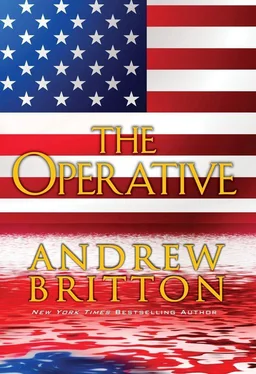Andrew Britton - The Operative
Здесь есть возможность читать онлайн «Andrew Britton - The Operative» весь текст электронной книги совершенно бесплатно (целиком полную версию без сокращений). В некоторых случаях можно слушать аудио, скачать через торрент в формате fb2 и присутствует краткое содержание. Жанр: Триллер, на английском языке. Описание произведения, (предисловие) а так же отзывы посетителей доступны на портале библиотеки ЛибКат.
- Название:The Operative
- Автор:
- Жанр:
- Год:неизвестен
- ISBN:нет данных
- Рейтинг книги:5 / 5. Голосов: 1
-
Избранное:Добавить в избранное
- Отзывы:
-
Ваша оценка:
- 100
- 1
- 2
- 3
- 4
- 5
The Operative: краткое содержание, описание и аннотация
Предлагаем к чтению аннотацию, описание, краткое содержание или предисловие (зависит от того, что написал сам автор книги «The Operative»). Если вы не нашли необходимую информацию о книге — напишите в комментариях, мы постараемся отыскать её.
The Operative — читать онлайн бесплатно полную книгу (весь текст) целиком
Ниже представлен текст книги, разбитый по страницам. Система сохранения места последней прочитанной страницы, позволяет с удобством читать онлайн бесплатно книгу «The Operative», без необходимости каждый раз заново искать на чём Вы остановились. Поставьте закладку, и сможете в любой момент перейти на страницу, на которой закончили чтение.
Интервал:
Закладка:
“Do you think someone else has the girl?”
“If we found out, someone else could have,” Kealey said. “They got to the Pakistani escort, hijacked the plane.”
“You’re right, though-that doesn’t make sense. It’s a lot of effort to go through. Snipers are easy enough to buy.”
“What about Jessica Muloni? Do you know her well?”
“Rendition Group and internal affairs wouldn’t have many encounters. Tough to find common ground. But she seemed square.”
Kealey looked at the pieces he knew. As in Baltimore, the shootings here were acts of terror. A city of some ten million citizens and a good chunk of the world’s commerce had been paralyzed in the space of less than an hour. Their presence could have been a coincidence. It made sense that a killer would target incoming and outgoing commuters. But he had to assume there was a connection.
“What if someone helped to arrange it so that two upstanding agents were brought here just to be stonewalled?” Kealey said as he glanced at Hunt and his colleagues. “There are other boots on the ground, but the Oval Office can’t trust any of them, not with a potential traitor at the Bureau. He or she could pollute everything, even intel going to otherwise clean divisions, like the NYPD antiterror units.”
Bishop considered this. “The president is more or less made to sit on his hands until… what?”
“Exactly. What? Another attack in another city? What does he do then? Dispatch another team? The pattern could go on for days.”
“So simple,” Bishop said. “It’s like a computer virus-with people.”
“We’ve got to take charge of this,” Kealey said. “What do you think about going back to the psyops project office where we were supposed to meet Hunt? Get up there, find out what he was working on, what May had been checking on?”
“Sounds good,” Bishop said. He looked to where Hunt was talking with the other members of his field office. They were pointing up South Street, presumably in the direction from which the gunfire had come. Helicopters were circling that area as well. “Check in if you’ve got anything. I’ll do the same.”
Kealey gave him a look. “How are you holding up, Reed?” He was concerned about Bishop personally, but also-and this was a hard fact of their line of work-he had to know that he could count on the man to stay focused.
“Everything seems surreal,” Bishop told him. “Short answer, I can function as long as I don’t think about it.”
He didn’t have to tell Bishop that what they were doing here was for all the Lauras of the nation. He could see in the man’s resolute expression that he grasped that.
Kealey gave the agent a supportive clap on the shoulder as he turned and went back in the direction of Centre Street.
Police were moving everywhere to try and clear the massive tangle that reached from the Brooklyn Bridge to Broadway and city hall. More people were standing still than moving; they didn’t know where to go. Many were shouting into cell phones, trying to hear above the sirens and choppers and the endless honking of horns. Other people were texting. Some were just sitting on benches or steps, alone or in pairs, talking, sobbing, or just resting with their head on their knees. A few were praying. People were asking the police if the subways were running, the PATH trains, the buses on Church Street. Some were trying to find out if the shootings at Penn Station had shut down the commuter lines. The officers, showing remarkable patience, did not know the answers as they tried to direct all foot traffic north. They just wanted to clear the area so vehicles could be moved. The FDR Drive and South Street were also at a standstill heading downtown. Bishop realized the best way to get back to Battery Park was to walk the mile or so. He knew he had to pick his way southwest and decided that once he left the on-ramp of the bridge, he’d turn down Park Row.
Brooklyn-bound pedestrians were still making for the bridge, dodging police who were trying to preserve the multiple crime scenes and rubbernecking as they passed. They were the most orderly group, like metal filings being drawn by a magnet. They obviously felt it was safe enough to cross now that the shooting was over and the sniper had apparently fled. Bishop had to weave his way through the mob. In spite of everything that had happened, he found himself smiling when he remembered being with his wife and daughter at Disney World on a holiday about eight years ago. It was packed solid, as these streets were, and he was holding both of their hands as he spearheaded an exit from the park. His hands closed beside him, and he could almost feel their soft, loving, trusting grip.
I miss you both, he thought.
He shouldered his way through people, twisted his way through cars, even climbed over fenders that were nearly touching. And then he froze. Among the stopped cars was a cab. Getting out less than 20 feet from him was someone he knew. It seemed surreal seeing her here, but when their eyes met, there was no question who it was, because she recognized him, too.
It was Jessica Muloni.
CHAPTER 23
ATLANTA, GEORGIA
Trask Industries AMRAD Division-advanced munitions research and development-was located beneath a boxy white warehouse in the Atlanta Industrial Park. Sitting at the dead end of Atlanta Industrial Drive NW, the four-thousand-square-foot, two-story structure was completely rebuilt in 2011. It generally resembled the others in the park. What set it apart was that the grounds were entirely surrounded by a fence. The thin iron bars were ten feet high, were painted white, and resembled spears on top. One would have to touch them to discover that there were ten thousand volts of electricity running through every bar. That was the maximum allowed by international law, as likely to kill as to render unconscious. There were signs warning of the danger, though it was unlikely anyone would get close enough to read them. The surveillance cameras that lined the barricade every 10 feet-backed by a guard station on the roof, staffed 24/7-alerted a corps of security personnel to any individual who made the turn off Atlanta Industrial Way NW, which was the only way in. The day’s scheduled arrivals had already been logged by their license numbers. If the cameras and computers didn’t match a vehicle with its license number, security converged at the gate and a spike plate rotated points up from the road. The plate did not just deflate the tires; it pierced the rims and stopped even a speeding car bomb.
After the attacks in Baltimore and New York, the chief of security at the facility received preliminary reports from the FBI on the type of weapons used. He and his team reviewed the estimated yield from the explosives at the convention center, studied photographs of the damage, and saw no reason to expand the existing protection of the facility. They were an unlikely target. Few people outside the industrial park knew Trask had a facility here, and no one beyond the staff knew it was the AMRAD Division. Still, the unlikely targets were the ones that were usually caught with their shorts around their ankles. So the team met, did its review, and was satisfied that nothing needed to be done.
Even if all the systems failed, even if a hijacker crashed an Airbus into the facility, the cost would be in human life and property, but not ordnance. The aboveground structure was comprised entirely of executive offices. The real research facilities-the labs, the molding shops, the low-yield ordnance ranges, the storage facilities-were all located on four belowground levels, each of them protected on the top, bottom, and sides by steel-lined concrete 10 inches thick. The steel was ribbed with wires that created an electronic web: in the milliseconds after an explosion, a strong electromagnetic force would be generated to disburse the concussive wave, minimizing the impact in any one spot. If something exploded upstairs, it was unlikely to penetrate the ceiling of the first sublevel. If something exploded down here, it was unlikely anyone upstairs would hear it.
Читать дальшеИнтервал:
Закладка:
Похожие книги на «The Operative»
Представляем Вашему вниманию похожие книги на «The Operative» списком для выбора. Мы отобрали схожую по названию и смыслу литературу в надежде предоставить читателям больше вариантов отыскать новые, интересные, ещё непрочитанные произведения.
Обсуждение, отзывы о книге «The Operative» и просто собственные мнения читателей. Оставьте ваши комментарии, напишите, что Вы думаете о произведении, его смысле или главных героях. Укажите что конкретно понравилось, а что нет, и почему Вы так считаете.












